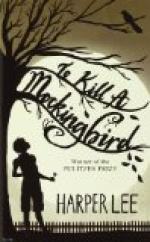|
This section contains 584 words (approx. 2 pages at 400 words per page) |

|
Although To Kill a Mockingbird was a resounding popular success when it first appeared in 1960, initial critical response to Lee's novel was mixed. Some reviewers faulted the novel's climax as melodramatic, while others found the narrative point of view unbelievable. For instance, Atlantic Monthly contributor Phoebe Adams found Scout's narration "frankly and completely impossible, being told in the first person by a six-year-old girl with the prose style of a well-educated adult." Granville Hicks likewise observed in Saturday Review that "Miss Lee's problem has been to tell the story she wants to tell and yet stay within the consciousness of a child, and she hasn't consistently solved it." In contrast, Nick Aaron Ford asserted in PHYLON that Scout's narration "gives the most vivid, realistic, and delightful experiences of child's world ever presented by an American novelist, with the possible exception of Mark Twain's Tom Sawyer and...
|
This section contains 584 words (approx. 2 pages at 400 words per page) |

|




